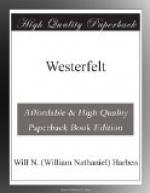“She’s got located,” remarked Slogan. “She’s a-goin’ to set in now an’ make ’erse’f comfortable.”
“She’ll burn the house down over our heads,” whined Mrs. Slogan. “Oh, Peter, I’m not satisfied! I’m anything but.”
The sun went down and night came on. Mrs. Slogan began to prepare supper, casting, the while, frequent glances at the door opening on the passage. Peter smoked pipe after pipe without being able to come to any definite conclusion as to how to surmount the difficulty. Suddenly he looked over his shoulder and tapped the heel of his shoe with his pipe.
“You’d better cook enough fer three,” was what he said, “an’ make more coffee. Ef she don’t he’p us drink it, we’ll need it to keep us company through the night. I know in reason ’at you won’t close yore eyes till—till we see some way out of the difficulty.”
“Peter Slogan,” said his wife, in a whisper, as she laid the table-cloth down in a chair and leaned over him, “you skeer the life out o’ me when you talk that away. I never seed you look like you minded anything before.”
“I’m glad I show some’n’,” he grinned, struggling back into his old sardonic mood. “I ’lowed I’d got too hardened to feer man, God, ha’nt, ur devil. Well, I don’t keer overly much about havin’ a crazy creetur’ so nigh me, an’ I ain’t a-goin’ to, ef I kin see any way out of it. We ain’t a thousand miles from the State asylum.”
Mrs. Slogan moved noiselessly as she unfolded the cloth and spread it. She put the coffee on the table and poured the floating grounds from the top into a tin cup.
“I’ll tell you what I’ll do,” she proposed, timidly. “I’ll fix ’er some supper on that piece o’ plank thar, an’ a big cup o’ coffee sweetened jest like she used to like it, ef—” She hesitated.
“Ef what? Out with it!”
“Ef you’ll take it in thar whar she’s at.”
Peter deliberated and cleared his throat.
“She’s yore sister,” he got out, finally, “an’ the last time I went to ’er cabin she wouldn’t listen to me no more ’n ef I wus a rat a-squeakin’. You see, a feller’s sorter expected to—”
“I don’t keer ef she is my sister, I ain’t a-goin’ in thar, an’ that settles it. I declare I’d be ashamed to call myse’f a man ef I wus afeerd uv a weakly, bent-over old woman like she is.”
Peter stirred uneasily in his chair.
“I don’t keer about holdin’ no talk with ‘er—ur startin’ ’er off by the sight o’ me—but I’ll go thar—I see ‘er door ain’t shet—an’ I’ll put the grub whar she’ll see it.”
“Well, that’ll do,” agreed Mrs. Slogan. “Feedin’ ‘er ain’t a-goin’ to make ‘er any wuss, an’ it mought have a quietin’ effect.”
Peter took the improvised tray when it was brought to him and went out with it, returning in a moment.
“I ketched ‘er a-lookin’ right at me,” he said, “an’ so I jest walked bold-faced in an’ put the stuff on a table in front of ’er. She looked down in the fire an’ didn’t speak, an’ I didn’t nuther. She didn’t look one bit dangerous. Now that I’ve seed ’er, I reckon I’ll sleep some. I’m dem glad I did. Ef you’ll jest take a peep at ’er you’ll feel better.”




